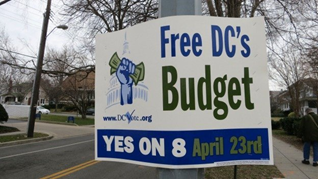The DC Council is planning to hold a historic second vote on the DC budget on June 10 — the first time the budget has had two votes — as a result of last week’s court decision on the DC Budget Autonomy Act, legislation adopted by DC voters to give residents and local leaders more control over the city’s budget. While there are questions about its legal status in the wake of the court decision, there is no doubt that gaining greater budget autonomy would be meaningful in both practical and symbolic ways. We hope that the court decision puts DC on a path toward greater autonomy over how city resources are spent.
Here’s our attempt to help you understand what budget autonomy means, why it is important, and where things stand on implementation of the Budget Autonomy Act
Perhaps most immediately, readers should understand that the DC Council plans a second vote on the dollars and cents of the budget — the Budget Request Act — on June 10.
What is Budget Autonomy?
 Under a ballot initiative overwhelmingly approved in 2013, the local portion of the DC budget would become law after a 30-day congressional review period. This is the way most DC legislation is treated currently — except the budget. For the budget, the District has to wait until Congress affirmatively acts to approve it — even though city programs and services are funded mostly with locally raised taxes and fees.
Under a ballot initiative overwhelmingly approved in 2013, the local portion of the DC budget would become law after a 30-day congressional review period. This is the way most DC legislation is treated currently — except the budget. For the budget, the District has to wait until Congress affirmatively acts to approve it — even though city programs and services are funded mostly with locally raised taxes and fees.
The Budget Autonomy Act also would allow DC to set its budget on a July-through-June basis — as most states do — rather than following the federal October-through-September fiscal year.
Why is Budget Autonomy important?
We can give you four good reasons!
1) A second vote on the budget, giving greater opportunities for local input into budget decisions. Without Budget Autonomy, the DC Council votes only once on the dollars-and-cents part of the budget — the Budget Request Act — before sending it to Congress. Because the Council’s draft revisions to the BRA usually are released by the Council chairman less than one day before the vote, there is limited opportunity to understand and change it. Under Budget Autonomy, the BRA has two votes spread at least two weeks apart (like other permanent DC acts), which gives residents a greater say in how city resources are spent each year. Budget Autonomy also extends the Council’s period of consideration of the Mayor’s proposed budget from 56 days to 70, allowing both the Council and the public more time to review and develop potential revisions to the budget as introduced.
2) No more shutdowns when the federal budget is deadlocked. Every time Congress and the President face challenges approving the federal budget, there is a risk that DC’s budget will get held up unnecessarily, too. That happened as recently as 2013.
3) Aligning the budget to match the school calendar. Right now, charter schools have to get a funding advance, because the October 1 start of the fiscal year is one month into the school calendar. And any new initiative in DC Public Schools cannot be implemented until October 1. That would go away if the D.C. Council uses its new authority under the Budget Autonomy Act to change the local budget to a July-to-June fiscal year.
4) Reduced chance of congressional “riders:” Congress often adds provisions to the DC budget, such as recent efforts to prevent marijuana legalization from going into effect. But if the Congress no longer affirmatively approves the DC budget every year, there will be fewer changes for Congress to add riders.
This means that budget autonomy is critical not only because DC residents should have more control over their affairs. Budget autonomy would help us make better budget decisions.
This also means that the Budget Autonomy Act would give more — but not complete — autonomy. Congress would still have authority to modify DC’s budget because of its power over the District under the US Constitution.
What Is the Legal Status of Budget Autonomy?
The Budget Autonomy Act was put on hold in 2014 following a federal court decision in a lawsuit that pitted the DC Council against both the mayor and the DC Chief Financial Officer. This year, Mayor Bowser effectively withdrew the arguments that had been made by Mayor Gray before the federal court, prompting a federal appeals court to vacate the court decision that had put the Budget Autonomy Act on hold, and order the case returned to DC Superior Court for possible further proceedings.. But the Chief Financial Officer remains an active defendant and it is uncertain what position he and the DC Attorney General will take. That leaves the future status of the Budget Autonomy Act unclear. But for now, the Budget Autonomy Act is the law in the District of Columbia and the DC Council and the Mayor are proceeding to implement that law.
We at the DC Fiscal Policy Institute are not in a position to assess the legal issues. But we will eagerly watch the Council’s vote on the budget next week, and we are hopeful that DC residents and leaders can look forward to greater control over how city resources are spent.
To print a copy of today’s blog post, click here.
